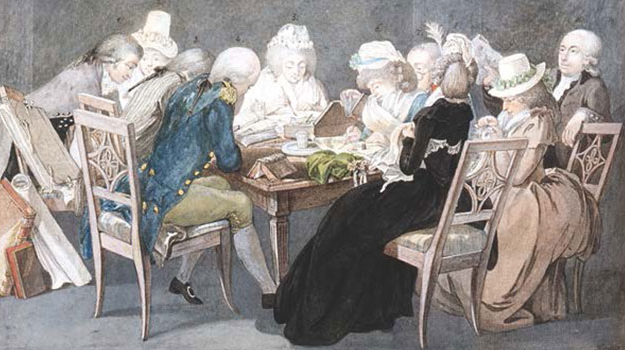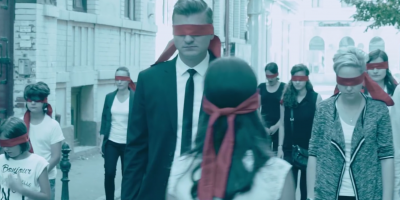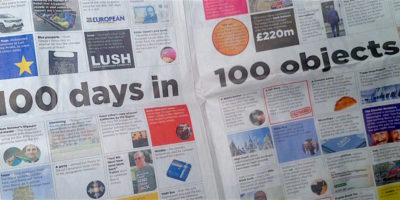Following a prayer breakfast in Strasbourg last year, some Euro-Parliamentarians asked me how they and their staff could learn more about Europe’s history and the background to today’s issues.
“We’re so busy with our politics we don’t have time to read or think,” they complained.
Kathia Reynders, our Belgian colleague in the Schuman Centre, came up with the idea to open a salon in Brussels as an ‘informal space for conversations about Europe’. This week she moved into an apartment in Boulevard Charlemagne to set up a salon a stone’s throw from the Berlaymont headquarters of the European Commission and two minutes’ walk from the Schuman rail and metro station.
Over the coming months volunteers will help her prepare the salon to hold ‘conversations’ with special invited contributors – authors, academics, politicians, journalists – addressing contemporary European issues from the perspective of Christian faith and values.
As an informal space for dialogue on philosophy, religion and politics, the salon emerged in sixteenth century Italy and developed in seventeenth and eighteenth century France, usually hosted by influential women of means who set the topics and invited guests. Neither a church function nor a state event, the salon became an incubator of Enlightenment ideas, much as the coffee house in London and Vienna.
But much earlier, Jerome, the early church father of the 4th and 5th centuries, wrote of salons in Rome that became informal centres of Christian learning argument and devotion, held in the households of influential women such as Marcella and Paula.
Support
Kathia, a native of Brussels, assisted me in the Schuman Centre office here in Heerde, the Netherlands, from early last year until last month. She has studied and worked in various YWAM centres in Europe, holds a masters degree in international relations and is starting further post-graduate studies in Christianity and Society at Tilburg University. An advisory council drawn from a broad range of Christian movements and organisations based in the Brussels region, including YWAM, IFES, COMECE and the EEA, supports her in her work in the salon.
In addition to the regular ‘conversations’, Kathia plans to hold book circles, film evenings, excursions and a European Studies Course, for all interested in understanding Europe from the perspective of faith and values. Activities will be posted on the Schuman Centre website, www.schumancentre.eu/salon. The salon will offer a resource library of books, magazines and videos on Europe’s past, present and future in an atmosphere of quiet reflection and study.
Although not fully operational until the new year, the salon will host an inaugural event later this month, on Saturday October 29: an excursion to the Erasmus House in Anderlecht on the outskirts of Brussels, two days after the birthdate of the famous Christian Humanist, and two days before Reformers Day. October 31 will officially end the Year of the Bible, called to commemorate the publication of Erasmus’ parallel Greek and Latin New Testament in 1516. It will also signal the start of the 500th year since Luther hammered his 95 theses to the Wittenberg Church door.
Misconceptions
This is an appropriate occasion therefore to explore Erasmus’ contribution to the Reformation and to challenge the widespread misconceptions about his beliefs, passions and lifework. All are welcome to join us in the salon at 14.00 for coffee and tea, when I will lead a conversation about Erasmus and the Reformation, before we walk to the metro and ride to Anderlecht. There we will have a tour of the home of his friend Pieter Wychman, where Erasmus convalesced in 1521. We will see rare and ancient editions of the scholar’s writings, as well as a collection of fifteenth and sixteenth century paintings. We then return to the salon for refreshments and a closing conversation.
Future excursions are planned to other sites in and around Brussels, including William Tyndale’s place of imprisonment and martyrdom in Vilvoorde, the university town of Leuven with its rich spiritual legacy, and as far away as Luxembourg and Scy-Chazelles (respectively Schuman’s birthplace and hometown in Lorraine, France).
In the New Year, Kathia and the fully-operational salon will host a European Studies Course led by myself on the fourth Saturday of each month, 10.00–15.30, from January to June. Two Saturdays focus on Europe’s past, unfolding the paradox of a Europe shaped by the Bible and by the rejection of the Bible. Two further days explore apppropriate responses to secularism, new spirituality and Islam in Europe today, and also evaluate the European project in the light of biblical values. Lastly two more Saturdays consider a relational framework for tomorrow’s Europe, and the challenges and opportunities we face.
Although this particular salon will be in the heart of the European capital, it is perhaps a model to be reproduced in the farthest corners of this spiritually needy continent.
Till next week,




[…] sur le rôle d’Erasme dans la Réforme. Nous avons organisé une excursion depuis notre nouveau Salon Schuman jusqu’à la Maison d’Erasme à Anderlecht, aujourd’hui un faubourg de Bruxelles, mais un […]